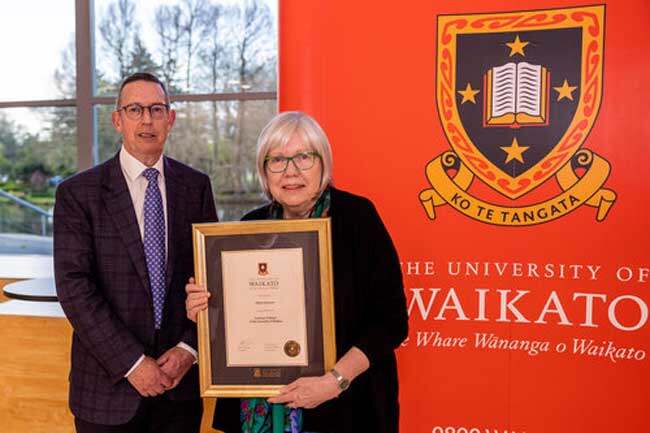A new Bachelor of Nursing Programme at Waikato designed to grow a more diverse health workforce for provincial areas in dire need of nurses is delivering on its goal, with 30 percent of its first cohort identifying as Māori or Pacific.


The University of Waikato launched its new nursing programme alongside partners Te Whatu Ora Waikato (formerly the Waikato District Health Board) and Clinical Partners from Community Care in 2020 and the driving forces behind the qualification have been recognised by the University at a special ceremony.
The event was supported by stakeholders from clinical and education partnerships across the region including Te Whatu Ora Waikato, Pinnacle Health Care, K’aute Pasifika, National Hauora Coalition and Hauraki PHO, Te Whatu Ora Bay of Plenty, Te Whare Wananga Awanuiarangi, Wintec, Massey University, Canterbury University, Nursing Council of NZ, NZ Nurses Association.
Professor Allison Kirkman has been recognised as Emeritus Professor while Sue Hayward, Chief Nursing and Midwifery Officer at Te Whatu Ora Waikato, and Jan Adams, Nursing Director of the Pinnacle Midlands Health Network, have been recognised as honorary professors.
Currently only seven percent of New Zealand’s nursing workforce identifies as Māori, a number that has remained static for 40 years. The New Zealand Nurses Organisation has set a goal to increase this to 15 percent by 2030.
“Our goal for the nursing programme at Waikato was always to develop the health workforce of the future. One that is diverse and reflects our provincial communities and can meet their needs where they are,” says Professor Kirkman.
“Our provincial areas are facing dire shortages of health practitioners and we only need to look at the roll out of the Covid-19 vaccination programme to see we need better representation of our diverse communities in health,” says Professor Kirkman.
The programme at Waikato immerses its nursing students in bicultural practice and understanding mental health throughout its three-year course, integrating their studies alongside mentors working in primary and tertiary health settings.
“The relationship between the University, Te Whatu Ora Waikato and community health care partners is key to our course and how we think about the future of our health workforce,” says Professor Kirkman.
Students complete 1,700 hours of clinical practice, compared with a minimum requirement of 1,100 hours, and Professor Kirkman says they experience a team-teaching approach throughout the qualification where cultural consideration and mental health is integrated across all modules.
She credits the nursing team for integrating the bicultural practice across the programme and for attracting the number of Māori and Pacific students studying.
“We know people often feel more comfortable if they are seeking and receiving health care from people they can relate to. It’s pleasing to see the qualification attracting students from diverse backgrounds, which is what we set out to do,” says Professor Kirkman.
She believes the future of nursing in New Zealand will not always be in hospitals and more work will involve primary health care in provincial areas. New Zealand could also not continue to rely on international nurses to fill the gaps.
Currently about 40 percent of New Zealand’s health workforce is overseas qualified – the highest rate in the OECD.
From 2023, the University has been approved to train highly skilled Nurse Practitioners. It has also reiterated its commitment to establishing a graduate medical school to address shortages of primary care doctors.




































